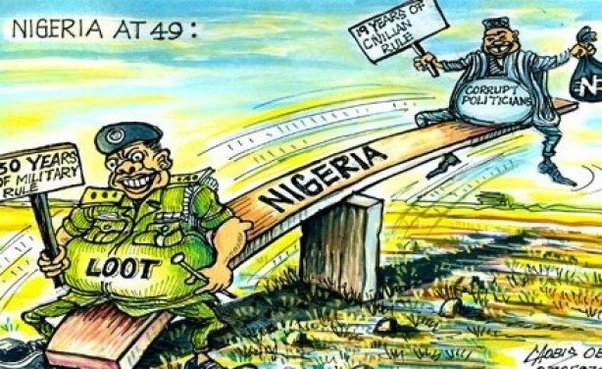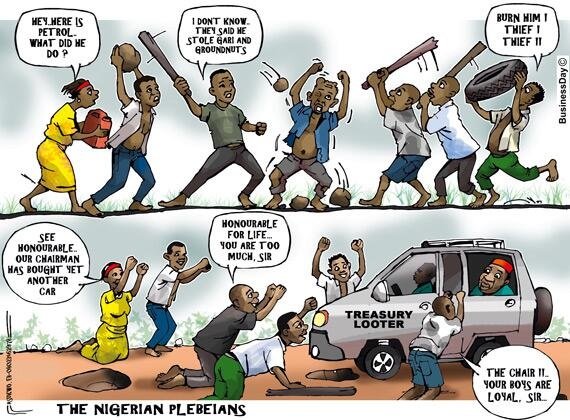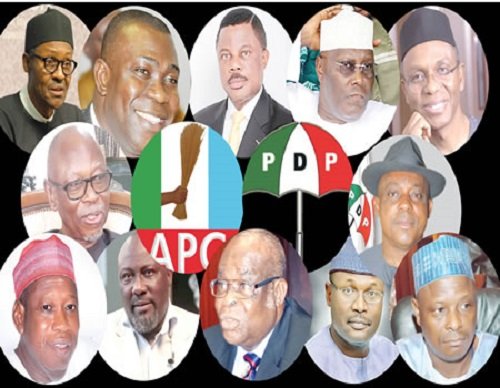This article is not a generalisation of Nigerian politicians, but an attempt at unmasking the camouflage of an average Nigerian politician.
There is no doubt we will all agree that Nigerian politicians are a special breed of individuals. There is no doubt we can almost all Nigerian politicians seem to have the same mindset, same goals and aspirations. We can say that the love most of them have it is for their pockets and not of the country. They put their desires before the interests of the nation. They are scammers of the highest order.
It is the fraudulent conducts of Nigerian politicians that pollute the entire ocean of our politics to the extent that politics in Nigeria is now synonymous with lying and deception. Nigerian politicians are notorious for telling ‘nice – to listen lies’ to electorate so as to get voted into public offices. They are extraordinary experts in the art of deception. This unique flair has been enabling them to either gain or retain power easily.

It is on this note that Morak Babajide Alabi expressed his perception regarding Nigerian politicians in the following words:
“There is one inborn quality that runs in the veins of these politicians – the art of deception. We cannot take this away from them, as this seems to be a characteristic that cuts across their divides. We have a nice way to cover up for them, so we do not refer to it as deception; we call it, in Nigeria street parlance, “Sweet Mouth”. There are different words for this in other languages, but the closest I can think of right now is “charisma”.
“Politicians lie. They lie in the most convincing manner that they, most times, believe their own lies. Surprisingly, we rarely call them out for their lies. A politician’s description of a perfect society is so graphic that we get taken on an imaginary journey of life in paradise.
“They are marketers. The difference here is that while marketers “flog” physical products or services, politicians sell themselves. In the advanced democracies, for example, for politicians, the “sales pitches” are policies oriented. They have no option because opponents are most times canvassing based on reality and not on imaginations. So the western politicians have to push farther to support their claims, not just standing on the podium.
“In Nigeria, the situation is different. Many of our politicians have no idea what governance is, talk less of the commitments to the posts they contested for. Rather, on top of their heads, they promise a better tomorrow. They make us believe that with them in the saddle of affairs a better future is guaranteed. Well, maybe they are right.”
Over the years, these arts of deception, mendacity and insincerity have proved to be a winning formula for our politicians as illustrated below by Sule Musa:
“Almost four years ago, they came to us. On bended knees they came begging, some almost crying. Yes crying for our attention. First, they wanted us to notice them. Then we did just that. But they wanted more. They wanted us to hear them out, well that was a simple demand, and so we obliged them. Then their beautiful story started.
“They are the choosen ones”. “They will take us to the Promised Land”. “They will provide all the good things of life to us”. They wanted to be our servants bla! bla!! bla!!! so we now asked them; what shall we do? They answered with all humility laden with mischief, saying “we want your votes in the coming election”.
“Haba, so this is what they have been circumnavigating! In annoyance, we retorted, “why can’t you politicians ever talk straight.” You will start by using the name of God, or alluding ethnic relationships before you drop the real message, may God save us from your deceit.
“But after all that, what choice do we really have, to vote or not vote for these double talkers? They always come with plenty promises, even when we do not solicit for their promise. There are very few things in this world that politicians will not promise to deliver to the electorate’s door step.
“And most times, like we have seen over the years, all they do when they come to power is to blunder and plunder the few good things that their office has to offer. Such is their way. So we are here again for them to go rambling with their now familiar sweet songs of deceit. We shall timidly empower them, than they shall climb upon our backs to their heavily fortified offices.”

In reality, such deceptive mannerism is not the end of Nigerian politicians’ subtle scam but only the end of its beginning as they have the reputation of jumping on the bandwagon of looting our collective resources as soon as they won elections and got inaugurated.
This is what we call ‘political corruption’ – the abuse of public office by enriching oneself with public resources.
The scamming activities of our politicians have made Nigeria a victim of political corruption, bad governance, political instability and extreme poverty despite its status as the African most populous country, largest economy, and biggest democracy, and the bellwether for Africa.
According to a report in June, 2018 by the Brookings Institution, a Washington, DC-based think-tank, Nigeria has overtaken India as the world’s poverty capital. The study estimated that 87 million people in a country of nearly 200 million were living in extreme poverty, compared with 73 million people in India.
The report also projected an increase in extreme poverty in Nigeria – Africa’s leading oil producer and most populous nation – until at least 2022.
Also, African Development Bank in 2018 reported that nearly 80 percent of Nigeria’s 190 million people live on less than $2 a day.
The above revelations are fundamentally shocking to any discerning mind. Natural and human resources abound in Nigeria but political corruption (corruption by political leaders) has been obstructing the citizens from tapping their benefits.
Nigerian politicians have been the genesis of underdevelopment of Nigeria through their mischievous and fraudulent conducts such as looting public funds, personal aggrandisement, profligacy, nepotism, bigotry, parochialism, greed, self-centredness and avarice. These are the major problems which brought Nigeria to its knees.
It is worthy to note that since the early days of the Nigerian independence, political leaders have performed abysmally; they have been more concerned with accumulation of riches rather than development of the country.

Considering the enormous amount of human and natural resources, and the numerous opportunities and possibilities that abound in Nigeria, instead of bringing the much needed development and building institutions that will enhance the quality of lives of the citizens, Nigerian political leaders resorted to exploiting and impoverishing the masses and have a tremendous waste of natural and human resources.
Through the fraudulent acts of our politicians, several billions of dollars have been stolen from Nigeria by corrupt politicians and other officials since the country’s independence in 1960.
Switzerland alone has returned over $723 million to the country in 10 years. And in 2017, the Nigeria government signed a Memorandum of Understanding (MoU) with Switzerland and the World Bank to return an additional $321 million of recovered assets.
Late General Sani Abacha alone, the country’s former military ruler is suspected of looting between US$3 and $5 billion in public money.

The Socio-Economic Rights and Accountability Project (SERAP) once disclosed how “55 politicians, top public officials and leaders stole N1.3 trillion from the Nigeria’s treasury between 2006 and 2013. A report by the group said the amount of money they stole between 2013 and 2017 was beyond the understanding of average Nigerians.
Dr. Uche Obodoechina threw more light on this issue in the following statement, “It is always with great consternation that one reads at the pages of Nigerian Newspapers of one politician or the other carting away millions and billions of money belonging to the public into one’s private accounts. It is not just one politician or one civil servant in an exalted position of trust.
“It is gradually becoming a culture and a tradition in Nigeria that public funds belong not to the public but to the most senior officers in government establishments who have access to the funds. It is not just the issue of those in higher or lower echelons of power. It has become gradually but systematically a way of life of most Nigerians in higher and lower places of service to defraud the public of its assets.
“It is not happening in one state alone. Neither is it only among ex- Governors or ex -chairmen of local government councils or ex-Senators and ex-Ministers. The practice is widespread. Even among ex-leaders of Students unions in our institutions, retired heads of schools in rural villages and even some of our self-made pastors and men of God are all neck- deep in this cankerworm. It is not a sickness of those who are retired from the services.
“It is a practice even among those serving today and now. The difference is about the moment of information. For those still serving, efforts are always being made to present the unsuspecting public with spurious accounts records of a faked stewardship while in service, while for the retired or the tired, the cats are let out of the bag as soon as they are out of service.
“One discovers that all that glitters is not gold. As a result of this situation, the entire nation is in trouble. Looting of public fund and properties has become fashionable. It has also brought to the death of the common good. People do not seen to be worried any longer about the dysfunctional state of the common good of the community. Self-interest and egoism have become the order of the day.”

Lastly, Nigerian politicians have been using religion and tribal sentiments to divide and enslave the masses such that they rob the nation blind.
In conclusion, Nigerian politicians are worse than internet scammers and more dangerous than armed bandits.

